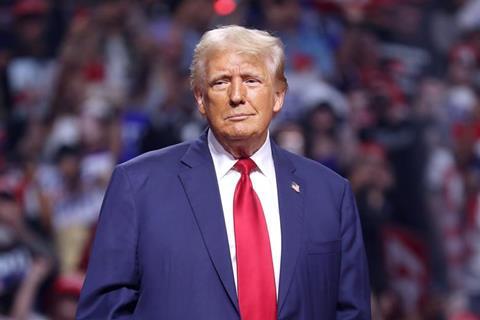Jeremy Roberts, head of TV & film at London legal firm Sheridans, on why calm heads must prevail
This weekend, Donald Trump hosted Jon Voight, one of his ‘special ambassadors’ to Hollywood, at Mar-A-Lago. Shortly after, Trump announced a 100% tariff on foreign films.
The announcement was intentionally loud on noise and quiet on detail. The shockwaves caused by it are an end in themselves - a feature, not a bug. Although we must take it seriously, there are good reasons to remain calm.
The wrong response to a real problem
Trump’s diagnosis is not completely off-base: Hollywood does have a problem. It continues to lose ‘runaway productions’ to countries like the UK and Canada, as well as to other US hubs like Atlanta, which offer generous subsidies.
While the logical response might have been to boost US incentives, Trump has instead reached for tariffs, his current solution-du-jour for every problem. Ironically, a tariff would hit the very US industry that Trump seeks to protect.
No details, many questions
The announcement is so vague that it is impossible at this stage to know how such a tariff would work and what it would apply to.
What defines a ‘foreign’ production? What revenues would the tariff apply to? Will it apply to TV, streaming, or only theatrical films? There is little merit in trying to explain what it could mean – there are too many variables.

For now, it is not the tariffs, but the uncertainty around the announcement that is the main threat to the industry.
Will US buyers, such as Netflix and Amazon, overreact and put on hold UK productions until they get clarity that those productions will not be hit by the tariff? Will distributors refrain from advancing any money against US sales for the same reason?
Will buyers and financiers try to insist on escape clauses allowing them to terminate if a tariff is imposed - something that would be fatal to most projects?
As lawyers, we can expect to see people trying to slip the word ‘tariff’ into force majeure clauses – a blunt instrument that simply dumps the tariff risk onto the other party.
At its worst, this uncertainty could delay or even kill some projects, but there is a reason to be positive.
A reason for optimism
The fact is that it is quite unlikely that a film or TV tariff materialises, or, if it does, that it stays in place for long. Here’s why:
- Complex implementation: A tariff on films and TV shows would be incredibly hard to define and implement. A tariff on a good is simple - you simply apply the tax on the good’s entry into the US. Applying one to film or TV is much more complicated, particularly if you want to target its impact on protecting those runaway Hollywood productions. Films and TV shows are complex patchworks of intangible investment, IP, labour, and revenue. They are not something you can easily tax at the border.
- Counterproductive impact: A US tariff on a good - for all the damage it causes - should benefit the US manufacturer of that good. In contrast, the general consensus is that the tariff on film and TV would damage the very US media companies that Trump is looking to protect. Those companies rely on making content cheaper abroad and using foreign subsidies to part-fund their projects. Indeed, the share prices of US studios actually went down after the announcement
- Industry lobbying: The US studios and streamers are lobbying hard against the tariffs. It is simply too hard to ‘reshore’ some of their biggest franchises back into the US. And US companies have reaped the benefits of the foreign subsidies. Their content is being part-funded by those foreign governments – something that should appeal to Trump.
- Legal challenges: If imposed, the tariffs will be challenged in the courts. There are already at least seven pending cases - which are strong on the merits - challenging Trump’s other tariffs. If Trump were to pursue the film tariff, it would undoubtedly be challenged too.
- Leverage tactics: We have seen Trump announce tariffs, then delay them, then say the quiet part out loud that he is only using them for leverage to be traded away as part of a wider trade deal.
- Trade surplus: The US has a huge trade surplus in films and TV. Much of Trump’s rationale for tariffs is based on the US having a trade deficit. However, in the film and TV sectors, the US runs a sizeable trade surplus. Consequently, any retaliation by other states would be disastrous for the US.
Keep calm and carry on
Wide-ranging tariffs are unlikely. Indeed, the White House already clarified that Trump’s Truth Social post is more proposal than reality, and “no final decisions” have been taken yet.

The bigger danger - for now, at least - is that the fear of the tariff causes more harm than the tariff itself.
Trump’s announcement has created disruption and uncertainty, which can bring markets and productions to their knees. But we can choose how we react to this uncertainty.
An overreaction will cause real and lasting damage to an already fragile industry. New productions would be put on hold, just when the sector has started to recover.
The UK government might quietly shelve the suggested targeted uplift to the HETV tax credit regime for shows with budgets of £1m to £3m per hour – not wanting to give Trump an easy stick to beat the UK with.
That would be a mistake. Our industry has thrived on taking risks. We should keep calm, and carry on with business as usual, until we know for sure whether this is a real threat or, as is much more likely, just another tweet.









No comments yet